


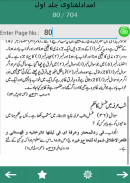
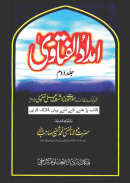
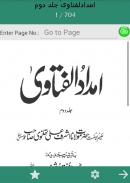


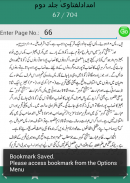
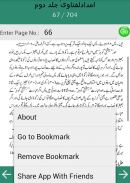
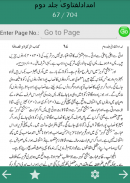
Imadadul Fatawa Vol-2

Description of Imadadul Fatawa Vol-2
Imdadul Fatawa Volume-I is fatawas of Hakimul Ummah Shaykh Maulana Ashraf Ali Thanvi (R.A.) , sorted and organized by Shyakh Mufti Muhammad Shafi Sahab. A remarkable book of fatawa by Hakimul Ummah Shaykh Maulana Ashraf Ali Thanvi (R.A.) . Some issues are discussed in great detail while others are answered in a concise manner. Both laymen and scholars can benefit greatly from Imdadul Fatawa.
Ashraf 'Ali Thanwi (August 19, 1863 – July 4, 1943) (Urdu: اشرف علی تھانوی) was an Indian scholar of the Deobandi school whose religious contributions are still useful to Deobandi scholars.
Thanwi graduated from the Darul Uloom Deoband in 1884. It is claimed that when Rashid Ahmad Gangohi, one of the founders of the institution, arrived for the graduation ceremony, Maulana Mehmud Hasan informed him that Thanwi, an especially intelligent student was about to graduate. Gangohi wanted to test this student by asking the most difficult questions that he could think of. Thanwi's answers reportedly amazed and pleased Gangohi, who himself conducted the Dastārbandī Jalsa, the turban-tying ceremony marking graduation.
After his graduation, Thanwi taught religious sciences in Kanpur for fourteen years. Over a short period of time, he acquired a reputable position as a religious scholar of Sufism among other subjects.His teaching attracted numerous students, and his research and publications became well known in Islamic institutions. During these years, he traveled to various cities and villages, delivering lectures in the hope of reforming people. Printed versions of his lectures and discourses would usually become available shortly after these tours. Until then, few Islamic scholars had had their lectures printed and widely circulated in their own lifetimes. The desire to reform the masses intensified in him during his stay at Kanpur.
Eventually, Thanwi retired from teaching and devoted himself to reestablishing the spiritual centre (khānqāh) of his shaikh in Thāna Bhāwan.\n\nDeath\nThanwi died in Thāna Bhāwan on July 4, 1943. His funeral prayer was led by his nephew, Zafar Ahmad Uthmānī, and he was buried in the graveyard of 'Ishq-e-Bāzān.





















